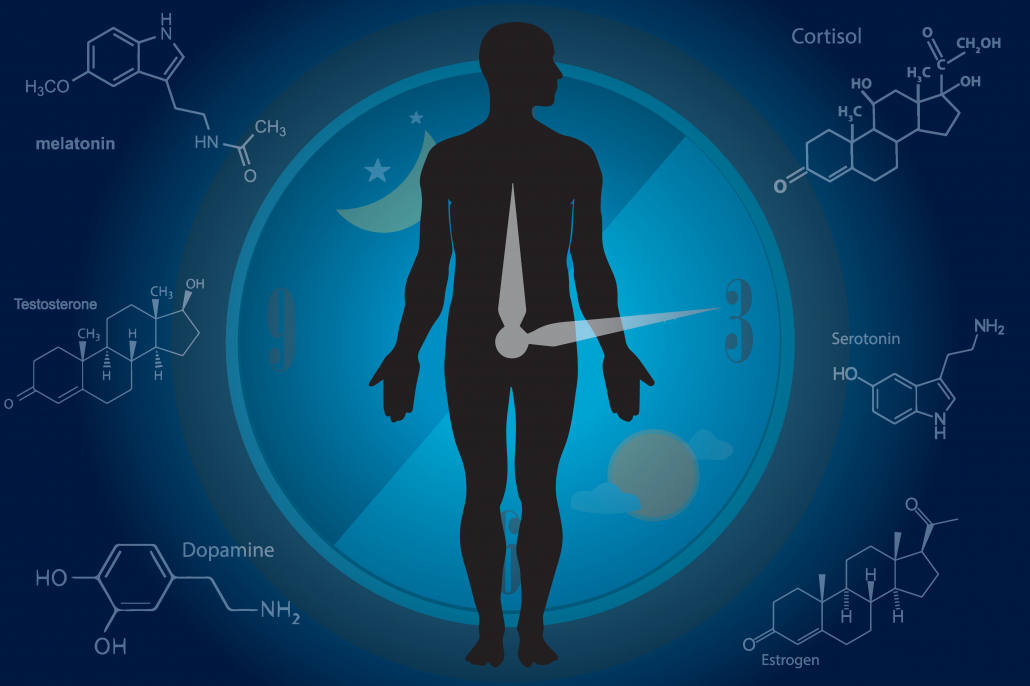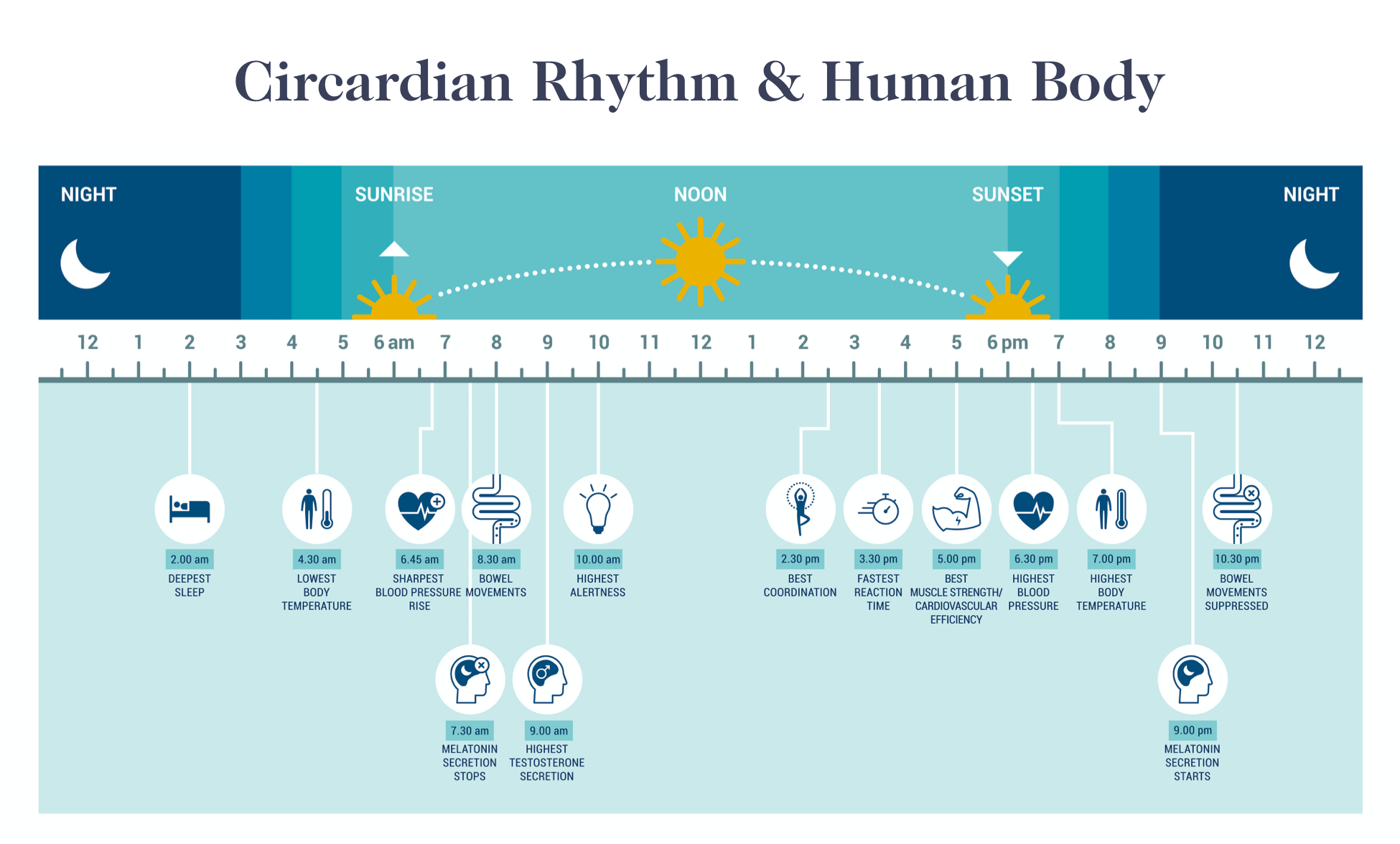We include products in articles we think are useful for our readers. If you buy products or services through links on our website, we may earn a small commission.
Circadian Rhythm Fasting: Everything you Need to Know

Table of Contents
Circadian fasting is a strategy for timing your meals to align with your body’s internal clock. It’s based on the idea that our metabolism works differently during each phase of the day.
Researchers are exploring how aligning what we eat with when we eat can increase weight loss, lower blood pressure, improve endurance, and reduce the risk of numerous diseases.
Keep reading to learn about circadian rhythm fasting and how it can improve your health.
What Is the Circadian Rhythm?
The circadian rhythm is a 24-hour internal clock that regulates many bodily functions including sleep, metabolism, digestion, hormone secretion, immunity, cognition, and neurobehavior.
This clock synchronizes your bodily functions with the rise and fall of the sun. Other factors such as your eating schedule can also influence the timing of your circadian rhythm. Over a period of millions of years, our bodies evolved to anticipate regular environmental changes and developed daily rhythms to function optimally.
Remarkably, almost every cell in your body follows a 24-hour clock. And nearly 80% of your genes function in a light-dark cycle.
These genes, known as “clock genes”, regulate the timing of essential bodily functions to align with wakefulness and sleep.
The control center for hundreds of different clock genes is called your suprachiasmatic nucleus (SCN). The SCN is a group of nerve cells in the hypothalamus that act as the master clock.
The SCN and cellular clocks receive and respond to internal and external signals to maintain your daily rhythms. But when these signals alter from their normal patterns, it can have negative consequences for your health and wellbeing.

Circadian Rhythm Disorders
Your circadian rhythm easily adapts to changes in lighting and nutrient intake. During our hunting and gathering days, this allowed our bodies to adjust accordingly to different seasons. However, in today’s modern society, the constant availability of electrical lighting and food can override the natural light-dark cycle and disrupt our sleep-wake patterns.
Common causes of circadian rhythm disruptions include night shift work, jet lag, prolonged light exposure, and altered sleep schedules.
Short-term circadian rhythm disruptions may result in impaired wellness, fatigue, and loss of concentration.
Unfortunately, long-term disruptions of your internal clock are associated with numerous disorders including:
- Mental illness
- Anxiety
- Depression
- Bipolar disorder
- Schizophrenia
- Metabolic disorders
- Diabetes
- Heart disease
- Obesity
- Sleep disorders
- Cancer
- Immune system disorders
- Premature mortality
Thankfully, it is possible to reset your circadian rhythm at a rate of 1-2 hours per day. It may take one week or more to return to a natural circadian rhythm if you completely reverse your schedule from night to day.
What Is Circadian Rhythm Fasting?

Circadian rhythm fasting, also known as the circadian rhythm diet, is a time-restricted eating plan that corresponds with your internal body clock.
A circadian diet involves eating during the daylight hours when our bodily functions like digestion and metabolism are most active. It also involves fasting after 7 pm when these internal processes slow down.
A typical day of circadian rhythm fasting may start with eating a large breakfast at 7 am soon after waking up. If your eating window is 12 hours, you would then eat your last meal by 7 pm.
Typically, your last meal of the day is smaller and lighter, which helps you avoid blood sugar spikes and weight gain due to your insulin response and metabolism winding down. You would then fast for the rest of the night until breakfast the next morning.
Benefits of Circadian Rhythm Fasting
Circadian rhythm fasting supports optimal circadian function and overall health. Below, we’ll outline the benefits of circadian rhythm fasting.
Fast Metabolism
Practicing a circadian rhythm diet can speed up your metabolism by helping restore your sleep-wake cycle. This enables you to achieve REM sleep.
REM sleep raises your basal metabolic rate to its highest level during sleep by increasing your body temperature and energy expenditure in the brain.
Improved Metabolic Health
Early meal timing on a circadian diet can also improve your metabolic health and reduce your risk of diabetes.
Research shows that your insulin response is better in the beginning of the day compared to later in the day. If you eat identical meals at breakfast, lunch, and dinner, your glucose levels will be the lowest after breakfast and the highest after dinner. In fact, researchers found that glucose levels after dinner are almost twice as high compared to breakfast.
Chronically high blood sugar levels are associated with many markers of metabolic disease and pre-diabetes such as insulin resistance, fatty liver and fatty-pancreas disease, and obesity. Excess blood sugar can also damage the blood vessel in the heart, leading to heart disease.
Weight Loss
On a circadian rhythm diet, timing your meals earlier in the day may help you lose weight. This is because meal timing affects the “thermal effect of food”, which is the energy needed to digest a meal.
One study found that the thermal effect of food is 44% higher in the morning than in the evening. Following a circadian diet can increase the calories burned after a meal, resulting in negative energy balance and weight loss over time. ]
In turn, avoiding eating in the evening hours is associated with lower body fat percentage and body mass index.
Undisturbed Sleep
Circadian fasting builds a stronger circadian rhythm, which helps you sleep more deeply and for longer.
Routinely eating in alignment with the natural light-dark schedule finely tunes your SCN–your internal nervous system maser clock. The SCN communicates with systems in the brain that control sleep such as the hypothalamo-pituitary-adrenal (HPA) axis and the pineal gland. The HPA axis lowers cortisol levels in the body at night, which makes you feel sleepy. At night, the pineal gland produces melatonin in response to darkness, which promotes sleep. It then raises cortisol levels in the morning to cause wakefulness.
Improved Digestion
A circadian diet can also jumpstart a sluggish digestive system. Research shows that the rate of intestinal motility and gastric emptying is higher in the beginning of the day than at night time.
Following a circadian rhythm diet may also improve digestive symptoms associated with circadian disturbances such as abdominal pain, bloating, diarrhea, and constipation.
Better Gut Health
A circadian rhythm diet may also have beneficial effects for your gut health. Research suggests that stabilizing your circadian rhythm may prevent inflammation and increased intestinal permeability.
Restoring your circadian rhythm to its natural state can also reduce your risk of intestinal dysbiosis. This condition occurs when the bad bacteria in your gut outnumber the good bacteria.
Robust Immune System
Early meal timing may also enhance your immune system and reduce your risk of health problems.
One study found that fasting later in the day when your melatonin levels are high, improves immune cell recovery, specifically B cell recovery. B cells are a type of white blood cell that produces antibodies that signal your immune system to destroy pathogens like bacteria and viruses.
Circadian Rhythm Fasting Vs Intermittent Fasting
Circadian rhythm fasting and intermittent fasting are similar. However, the circadian diet is more specialized than intermittent fasting alone because it times your meals to align with your internal body clock.
On a circadian diet, it’s encouraged that you time your meals early in the day, beginning as early as 7 am. On the other hand, intermittent fasting allows you to choose your own eating window. Most people who intermittent fast eat their first meal of the day at lunch.
Both circadian rhythm fasting and intermittent fasting entail an extended fasting period. Typically, circadian rhythm fasting involves fasting from 7 pm to 7 am whereas the most popular form of intermittent fasting involves fasting for 16 hours a day. This is known as the 16:8 method.
It’s also important to note that for women there are specific and more effective strategies for IF that you can learn about here
How to Start Circadian Rhythm Fasting
Follow these 5 steps to successfully stick to a circadian rhythm diet.
1. Eat Your Meals Earlier in the Day
Timing your meals earlier in the day will allow you to reap the benefits of circadian rhythm fasting. Start by eating your first meal as close to daybreak as possible.
For example, you may time your eating to windows from 7 am to 3 pm, 9 am to 5 pm, or 7 am to 7 pm. You can also extend your fasting window as long as you want as long as it fits within the light-dark cycle.
2. Limit Sugars and Refined Grains
Eating sugary foods and refined grains can spike your blood sugar levels after meals. If your diet consists mainly of these foods, it can increase your risk of diabetes. Eating a meal high in carbs before bed can also cause poor sleep.
Limit your intake of carb-heavy foods like white flour, rice, bread, cereal, crackers, and desserts. If you want to enjoy some of these foods, do so early in the day when your insulin response is most sensitive.
The optimal diet for circadian fasting consists of high-quality protein and nutrient-packed organ meats, healthy fats, and low-carb fruit and vegetables.
3. Avoid Eating at Night
Snacking or eating meals during the evening or night can disrupt your circadian rhythm. Avoid eating during your fasting window to allow your body to rest and recover.
Staying up late and eating at night can also slow down melatonin production and make it harder for you to fall asleep.
4. Follow a Consistent Daily Schedule
To stabilize and strengthen your circadian rhythm, it’s best to get up and go to bed at the same time every day.
5. Get Plenty of Light During the Day — Not at Night
Light exposure is essential to maintaining your circadian rhythm. Light enters your retina and sends a signal directly to your SCN–the control center for your circadian rhythm. This sets off a cascade of biological actions that make you feel awake and energized.
Avoiding light exposure in the evening can stimulate melatonin production and improve your ability to fall asleep. This also means limiting the use of electronic screens close to bed.
Circadian Rhythm Fasting: The Takeaway
Your circadian rhythm is best known for regulating sleep and wakefulness. But it also plays an important role in metabolism, digestion, hormone secretion, immunity, cognition, and neurobehavior.
Timing your meals early in the day when your body is most active can improve your circadian function and overall health.
Anyone can follow a circadian rhythm diet, no matter the food you eat. If you’re looking to boost your health, circadian rhythm fasting is a relatively easy adjustment that yields powerful health benefits.















